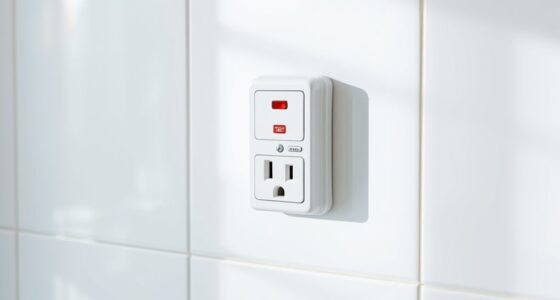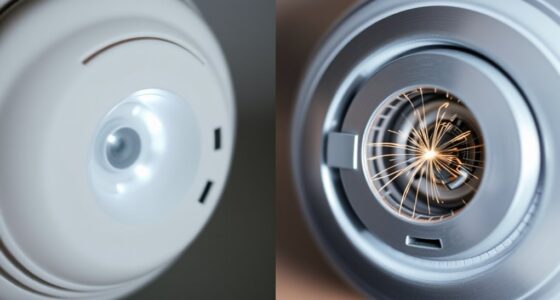When you think about the smell of electricity, you might notice a fresh, clean scent reminiscent of ozone. This happens because ozone forms from high-voltage currents and can evoke memories tied to stormy weather. However, electricity can also smell alarming—like burnt plastic or acrid fumes. These odors often signal overheating wires or insulation breakdown, which can lead to dangerous situations. If you catch these smells, it's essential to act quickly. Understanding the difference can keep you safe, and there's much more to discover about the intriguing scents linked to electricity and safety measures you should know.
Key Takeaways
- Electricity itself is odorless, but electrical malfunctions can produce distinct smells, often resembling burning or acrid odors from overheated wires.
- A burning smell typically indicates insulation breakdown or overheating wires, suggesting potential electrical fires.
- The scent of burning plastic is a common indication of electrical issues, often arising shortly after devices are powered on.
- Flickering lights and tripped circuit breakers often accompany unusual smells, signaling underlying electrical problems that require immediate attention.
- Prompt evacuation and consultation with a professional are crucial upon detecting any unusual electrical odors to ensure safety.
Understanding Ozone and Its Smell
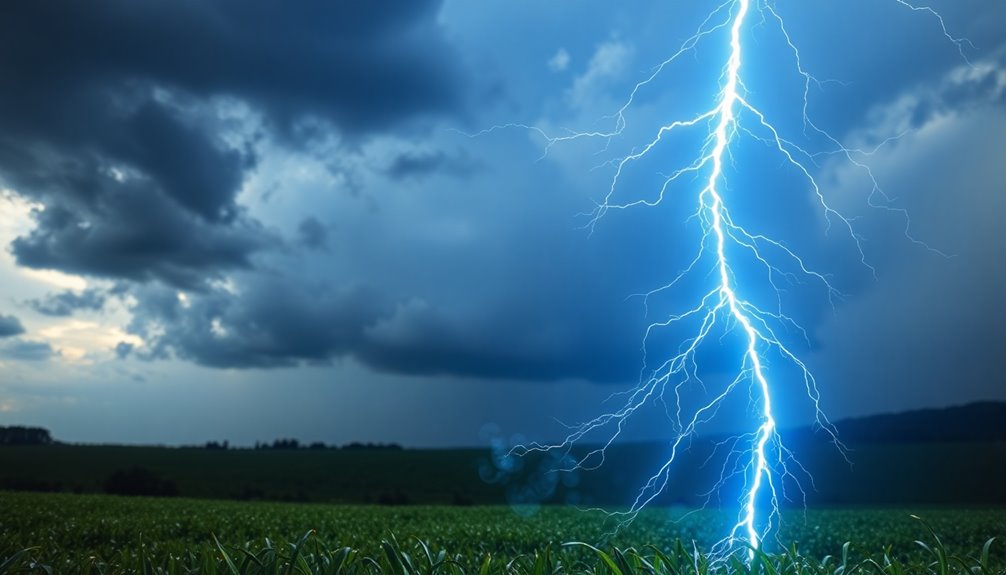
When you step outside during a storm, you might catch a whiff of something unusual in the air—it's likely ozone. This unique scent, often described as fresh or clean, is scientifically known as trioxide (O₃). Ozone forms naturally in the atmosphere through the ionization of oxygen molecules, typically triggered by high-voltage electric currents or ultraviolet radiation.
During thunderstorms, lightning creates ozone through electrical discharge, which contributes to the distinct smell you notice before or during the storm. You might find that this odor is so potent it can evoke strong memories linked to weather changes and electrical activity.
While the fresh scent of ozone can be invigorating, it's important to remember that ground-level ozone can form from reactions between pollutants and natural gases, leading to health risks at high concentrations. These risks include respiratory issues and throat irritation.
The Science Behind Electrical Odors

Electrical odors are often alarming, and they can point to serious issues within your home's wiring. The burning smell you notice is typically linked to overheated wires that break down insulation materials, releasing acrid chemicals into the air. This burning smell usually appears shortly after you power on electrical devices, often within 30-60 seconds, signaling potential problems with outlets or appliances.
When electrical devices create excess heat, overloaded circuits can lead to burnt odors. Faulty wiring generates resistance, compounding the risk of overheating, which can be dangerous. It's important to remember that just like heat pumps, inadequate maintenance of electrical systems can lead to decreased efficiency and potential hazards.
You should also be aware of other signs of electrical issues, such as flickering lights, frequent tripping of circuit breakers, and discoloration or charring around outlets, as these may correlate with unusual smells.
Immediate action is vital upon detecting a burning smell. Ignoring it can lead to serious fire hazards. If you notice these odors, it's important to inspect your wiring and consider replacing faulty components.
Distinguishing Electrical Fire Smells

When you notice a burning smell in your home, it could signal an electrical fire.
Familiarizing yourself with different electrical odors and their warning signs, like flickering lights or tripping breakers, can help you act quickly.
Recognizing these smells early can prevent dangerous situations and keep your home safe.
Common Electrical Smell Types
If you notice a strange smell in your home, it's important to identify its source, especially when it comes to electrical issues. One of the most concerning smells is that of burning plastic, which often signals an electrical fire. This odor typically arises from overheated wires or the breakdown of insulation, indicating something's gone wrong.
Another common smell is an acrid odor, which can point to faulty wiring or overloaded circuits. As insulation melts, it can release harmful chemicals, making it important to investigate right away.
Many homes over 40 years old may have outdated electrical systems, increasing the chances of encountering these unique burning smells. If you notice hot outlets, frequent blown fuses, or hear unusual buzzing noises, pay attention. These symptoms often produce characteristic smells that shouldn't be ignored.
Understanding these common electrical smell types can help you take immediate action before a more serious issue arises. Always trust your sense of smell—it's a vital warning system for potential danger in your home.
Don't hesitate to call a professional if you suspect an electrical problem.
Identifying Warning Signs
Noticing a burning smell in your home can be alarming, especially since it often signals potential electrical problems. If you detect a burning smell, pay attention to the source. A burning smell associated with plastic usually indicates overheating wires or insulation breakdown, which could lead to an electrical fire.
Keep an eye out for common warning signs, like flickering lights, frequent tripped circuit breakers, or discoloration around outlets. These are clear indicators that something's not right.
If the burning smell arises only when devices are powered on, it could point to an outlet issue, particularly if it happens within 30-60 seconds of activation. Loose connections in outlets can cause arcing, resulting in a burning odor and a serious fire risk.
If you experience a persistent burning smell, it's essential to act immediately. Turn off the circuit breaker to cut power to the affected area and consult a licensed electrician right away. Ignoring these signs can lead to dangerous situations, so always prioritize safety when it comes to electrical concerns.
Identifying Common Electrical Issues
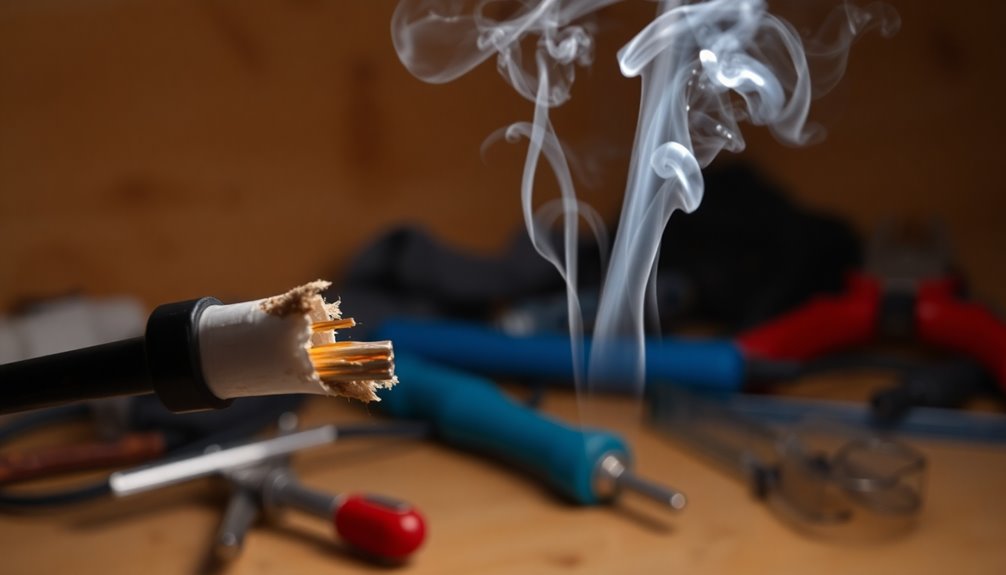
Amid the daily hum of household activities, electrical issues can quietly lurk, posing serious risks if left unchecked. One of the most alarming signs is a burning smell coming from electrical outlets. This often indicates overheating due to faulty wiring or overloaded circuits, which can lead to fire hazards if not addressed promptly.
Here are some common signs of electrical issues you should watch for:
| Signs of Electrical Issues | Potential Risks |
|---|---|
| Burning smell from outlets | Fire hazards |
| Flickering lights | Loose connections or overload |
| Frequent tripping of circuit breakers | System instability |
Loose connections can cause arcing, resulting in burning odors and potential damage to your electrical system. Regularly inspecting your outlets for corroded wires and wear can help prevent these dangers. Remember, if you detect a burning smell, immediately disconnect the power and consult with a licensed electrician. Taking these steps not only protects your home but also guarantees the safety of your loved ones.
Health Implications of Ozone Exposure

Ozone, often seen as a shimmering layer in the sky, can pose serious health risks when it accumulates at ground level. When you're exposed to high concentrations of ozone, you may experience respiratory issues, including worsening asthma, throat irritation, and even lung damage. This risk is particularly significant for vulnerable populations like children and the elderly.
Short-term exposure to elevated ozone levels can lead to troubling symptoms such as coughing, chest pain, and reduced lung function. On high pollution days, when ground-level ozone rises, your health could be at greater risk.
The Environmental Protection Agency (EPA) has set national ambient air quality standards for ozone to safeguard public health, underscoring the serious implications of this pollutant.
Prolonged exposure to elevated ozone levels isn't just uncomfortable; it can result in chronic respiratory diseases, necessitating continuous monitoring and public health interventions.
Practical Tips for Fire Prevention

When it comes to fire prevention, staying proactive can make all the difference in keeping your home safe. By taking simple steps, you can greatly reduce potential fire hazards. Here are some practical tips you should follow:
- Inspect electrical cords and outlets regularly for any signs of damage, like fraying or discoloration.
- Avoid overloading outlets by distributing power across multiple circuits and using surge protectors to reduce the risk of electrical fires.
- Unplug appliances when not in use, especially in wet areas, to lower the chances of short circuits and overheating.
Additionally, if your home is over 40 years old, consider scheduling professional inspections of your electrical systems. This can help identify potential hazards before they escalate.
It's also vital to educate everyone in your household about electrical safety. Make sure they know the signs of electrical issues, such as burning smells or frequent circuit breaker trips. Regular inspection of essential safety equipment can further enhance your fire prevention efforts.
Actions to Take When Smells Occur
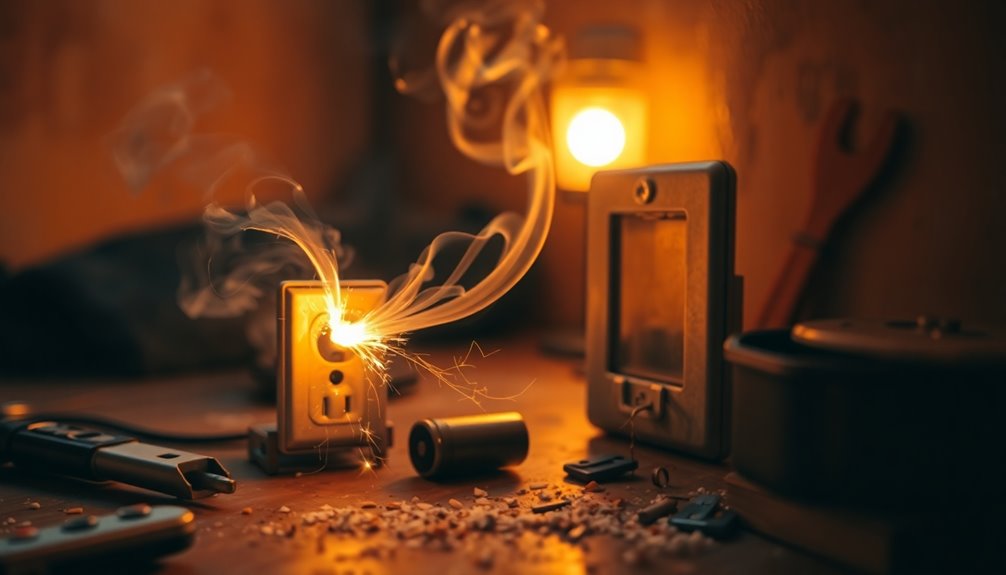
If you smell something unusual, your safety comes first—evacuate the area immediately.
Next, try to identify the potential source of the smell, but don't put yourself at risk.
Finally, reach out to a professional to address any electrical issues before using any affected appliances or outlets again.
Immediate Evacuation Needed
Often, detecting a burning smell from an outlet signals an urgent need for action. Don't ignore this warning; your safety is paramount.
Here's what you should do immediately:
- Turn off the circuit breaker for the affected outlet to help prevent potential fire hazards.
- Evacuate the building if you see flames or smoke, ensuring everyone is out before you contact emergency services.
- Unplug any connected appliances if it's safe to do so, avoiding any risk to yourself.
Once you've taken these steps, ventilate the area by opening windows and doors to disperse harmful fumes while waiting for professional help. Regularly monitoring indoor air quality is important to ensure a safe living environment.
Remember, safety comes first. If the burning smell lingers after these precautions, consult a licensed electrician to inspect the outlet and surrounding wiring.
It's better to be safe than sorry, and addressing these issues promptly can save lives and property.
Always trust your instincts in such situations—if it doesn't smell right, act quickly!
Identify Potential Sources
A burning smell in your home can be alarming, and identifying its source is vital for safety. If you detect a smell resembling burning plastic, it might indicate overheating wires or faulty electrical connections. Start by turning off the circuit breaker for the affected outlet immediately. Avoid using any devices connected to that outlet until a thorough inspection is conducted.
Next, look for signs of electrical issues. Flickering lights, frequent tripping of circuit breakers, or discoloration around outlets are all red flags that something's wrong. Loose connections within outlets or overloaded circuits can generate heat, leading to that burning smell. It's important to address these issues promptly to prevent potential fire risks.
Regular maintenance of your electrical systems can also help prevent these smells. Check for warm outlets and verify you're using the proper wattage for your appliances.
Consult a Professional
When you catch a whiff of burning odors from electrical outlets or devices, it's crucial to act fast and consult a professional. Ignoring these smells can lead to severe hazards, including electrical fires.
Here's what you should do immediately:
- Turn off the circuit breaker to prevent further risks.
- Avoid using the affected outlet or appliance until a licensed electrician inspects it.
- Look out for additional signs like flickering lights or discoloration around outlets.
Persistent burning smells often indicate overheating, damaged wiring, or overloaded circuits. These issues require urgent attention, so don't hesitate to consult a professional. A qualified electrician will conduct a thorough evaluation to identify and fix the problem safely. Additionally, establishing clear safety protocols can help prevent these situations. A qualified electrician will conduct a thorough evaluation to identify and fix the problem safely.
Additionally, regular inspections of your electrical systems can help prevent these situations. Adhere to safety protocols, verify proper wattage ratings, and use surge protectors to mitigate risks.
The Role of Static Electricity

Have you ever noticed a peculiar smell in the air during a dry winter day? That distinct, pungent odor often comes from ozone, a byproduct of static electricity.
When you walk on carpets or remove clothing in low-humidity conditions, static electricity builds up, leading to high-voltage discharges. These discharges can ionize air molecules, producing that sharp smell of ozone you might associate with impending storms.
Static electricity is particularly prevalent in winter months when humidity is low, making it more likely for you to encounter these electrical discharges. The smell of ozone can trigger strong sensory memories, connecting you to past weather changes.
It's fascinating how something as simple as walking across a room can lead to such a unique olfactory experience.
Moreover, this ionization process doesn't just create ozone; it can also enhance the freshness in your environment.
The Connection Between Weather and Smell

The connection between weather and smell is evident as you step outside before a storm. You might notice a distinct, fresh scent in the air—this is ozone, a byproduct of electrical activity like lightning. The scent is particularly potent in humid conditions, enhancing your ability to smell it before the storm hits.
Here are a few key reasons why weather influences scent:
- Ozone Generation: Electrical discharges during storms ionize the air, creating ozone, which has a clean smell.
- Wind Transport: Wind carries ozone and other atmospheric scents, amplifying the sensory experience of changing weather.
- Pre-Rain Aromas: As rain approaches, organic residues mix with moisture, resulting in unique scents heightened by the presence of ozone.
As you breathe in, you may find that the smell of ozone signals nature's electrical dance. The combination of humidity and electrical activity makes this scent more detectable, creating an anticipatory atmosphere that's uniquely tied to storms.
Next time you sense that fresh aroma in the air, you'll know it's nature's way of signaling a change.
Historical Perspectives on Electricity and Smell
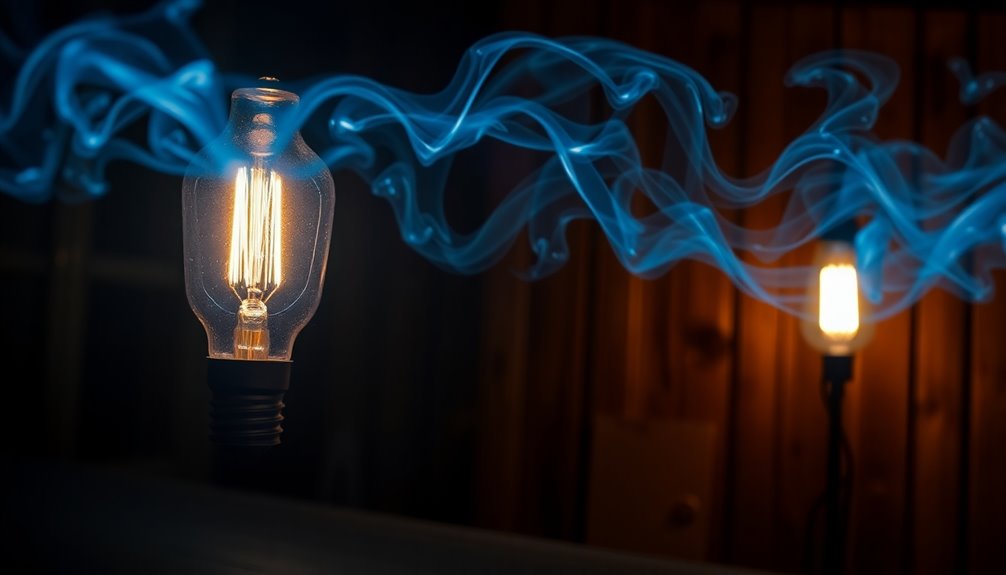
Electricity's intriguing aroma, particularly the fresh scent of ozone, has fascinated people for centuries. In the late 18th century, pioneers like Alessandro Volta and Michael Faraday first noted this distinctive smell during their experiments with electricity. They recognized ozone's clean scent, which became a hallmark of electrical phenomena.
Fast forward to World War I, when ozone gained prominence for its disinfectant properties. Medical treatments utilized its distinctive odor to signal healing, further embedding ozone in society's collective memory.
The late 19th and early 20th centuries saw the rise of electrical appliances in homes, increasing awareness of electrical smells, especially those associated with overheating wires and burning insulation.
As electrical safety standards evolved in the mid-20th century, the relationship between electricity and smell deepened. Detecting burning odors became essential for identifying potential hazards, emphasizing the significance of ozone as a warning signal.
Cultural references to the smell of electricity, particularly ozone, emerged in literature and art, showcasing society's growing relationship with electrical phenomena. This historical perspective reveals how ozone has shaped our understanding of electricity and its sensory implications throughout time.
Frequently Asked Questions
What Does Electric Shock Smell Like?
When you experience an electric shock, you might notice a distinct smell in the air.
It's often a burning odor, similar to burnt plastic or overheated insulation. This scent arises from damaged wiring or components overheating.
You could also detect a fresh, clean smell of ozone, especially near high-voltage areas.
Being aware of these smells is essential, as they can signal dangerous electrical issues that could lead to serious safety hazards.
Stay cautious!
Why Do I Keep Smelling Electricity?
Imagine walking into a room where the air crackles with energy, like a static charge before a storm.
If you keep smelling electricity, it's likely due to overheating wires or faulty connections. This smell can indicate serious problems, like overloaded circuits.
You should act quickly—turn off the circuit breaker and call a licensed electrician. Ignoring these smells could lead to dangerous electrical fires, so don't wait for the storm to break!
Is There a Smell Before an Electrical Fire?
Yes, there's often a smell before an electrical fire. If you notice a burning plastic or acrid chemical odor, it could mean wires are overheating or insulation is breaking down.
You might also see flickering lights or feel heat coming from outlets. It's essential to act quickly—turn off the circuit breaker and call a licensed electrician.
Don't ignore these signs; they could save your home from a devastating fire.
Why Do I Smell Electrical Burning but Nothing There?
If you ever think you're smelling an electrical burning scent without any visible signs, it's like your house is whispering a warning!
This odor often signals overheating wires or faulty connections. You might've overloaded outlets or even mild corrosion causing resistance.
Don't ignore it—disconnect power and consult a licensed electrician immediately. It's better to be safe than to risk a fire hazard lurking just beneath the surface!
Conclusion
In a world buzzing with electricity, you've uncovered the truth about its distinctive smell. Like a lightning bolt slicing through the air, ozone carries its sharp scent, warning you of potential hazards. You've learned to identify the nuances of electrical odors, ensuring your safety and health. So, next time you catch a whiff of that strange aroma, trust your instincts and take action. Awareness is your best ally in maneuvering the electrifying landscape around you!


